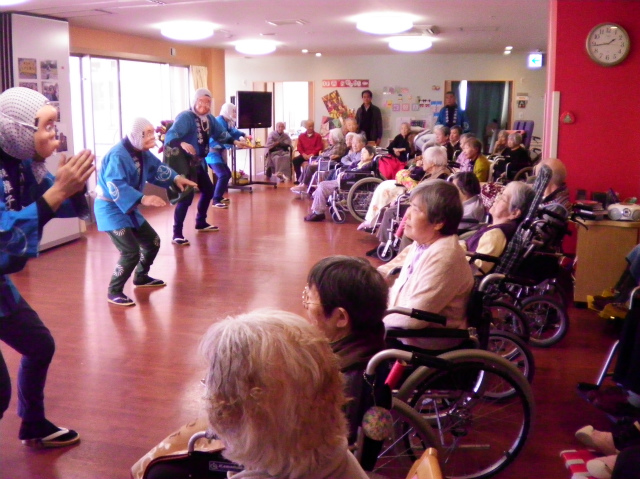A “waiting elderly” problem in Japan 2015/03/10
Rina Koizumi (17)
Japan is said to be an “aging society” today. One of the problems of an aging society is that “waiting elderly”, meaning elderly people who are waiting to enter a special care nursing home because there are no spaces available. I investigated the actual conditions of the waiting elderly problem.
I asked Shoji Kawamoto, Elderly Facility Deputy Manager and Group Leader, Kanagawa Prefectural Institute of Public Health and Welfare Department, about whether or not people who wish to enter the special nursing home has increased. He said it has. The government created a nursing care insurance system in 2000. Since then, every year in April, the government conducts a survey that looks at the number of people wanting to enter nursing homes. In the first survey that year, in Kanagawa prefecture, there were 6,300 people on the list. In 2004 that number rose to 21,585, an increase of over 15,000 people. Since the 2004 survey, the numbers continue to rise. In 2014, 22,928 were on the list due to the increase of the elderly population.
 In my next interview with Sumire Narita, Certified Care Worker and Care Manager, Social Welfare Service Corporation Shikou Kai and Director of Aobadai Area Care Plaza, I learned that many elderly people who have difficulty in their daily life come to Aobadai Area Care Plaza. Sometimes, people come only for consultation about nursing care for their who live in distant suburbs. This care plaza accepts applications for care level assessments for long term care.
In my next interview with Sumire Narita, Certified Care Worker and Care Manager, Social Welfare Service Corporation Shikou Kai and Director of Aobadai Area Care Plaza, I learned that many elderly people who have difficulty in their daily life come to Aobadai Area Care Plaza. Sometimes, people come only for consultation about nursing care for their who live in distant suburbs. This care plaza accepts applications for care level assessments for long term care.
To make use of the nursing service provided by nurse-care insurance, the necessity for care must be recognized. In this system, several steps must be taken to receive authorization. First, the person or their family send in their application to a public office or to a Community General Support Centers.
Second, a certified examiner visits the home to confirm the information stated in the application. Also, the home doctor writes a statement to support the application. Then the Certification Committee of Needed Long-Term Care, organized by health, medical and social welfare experts, examines the application. The applicant may be assigned a Certification of Needed Support with a number between 1 and 2 or a Nursing Care Level between 1 and 5 based on assessed care needs and ability to live independently. The more care services one needs, the higher the score they receive. If the applicant receives a Certification of Needed Support, a preventive care plan will be provided.
If an applicant receives a Certification of Nursing Care level with a number between 1 and 5, in addition to the care plan, they can also apply to enter a nursing home. However, if the nursing home is full, one has to wait. This is the problem of the “waiting elderly.”
If one has to wait to enter the nursing home with a high level of nursing care needs, it would be difficult to maintain the daily routine alone. Therefore, one would need more help in that case. Nowadays, there are many services to support a daily routine as an alternative choice to nursing homes such as household help including cooking, cleaning or laundry. Also, there are day centers providing a place for the elderly to spend their time and have meals or bathe. Thanks to these services, the waiting elderly are able to maintain their lives more easily than they had before.
Mr. Kawamoto pointed out one of the causes of the waiting elderly problem and that is that many people apply to many nursing homes at the same or apply without any urgency. In other words, there are many people rushing to apply to nursing homes because they worry about their future. However, some of them wouldn’t enter the nursing home even if their application was approved because they are still healthy enough or can receive care from their family members.
It is natural for us to worry about our future but in order to reduce the waiting elderly problem, we shouldn’t apply for nursing homes due of our insecurities. We should rather wisely utilize the living support service that appropriately supports our daily functioning .